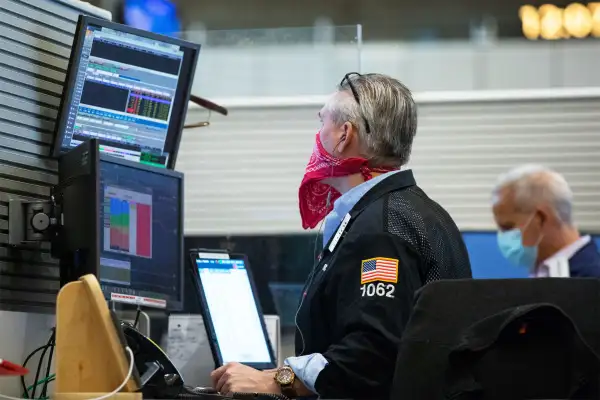The Stock Market Tumbles for a Second Day in a Row, With Tech Stocks Leading the Way — But Don't Panic
Money is not a client of any investment adviser featured on this page. The information provided on this page is for educational purposes only and is not intended as investment advice. Money does not offer advisory services.

Technology stocks continue to lead the market down on Friday. For the second day in a row, the tech sector — which had been soaring in recent weeks — saw a major sell-off.
The Dow Jones Industrial Average dived more than 500 points Friday, after plunging 800 points on Thursday. Meanwhile, the Nasdaq Composite fell 5% and the S&P 500 dipped nearly 3% Friday. Apple's stock fell around 7%, and Facebook, 5% in trading on Friday morning.
But market volatility is part of investing in the stock market, and sticking to your plan will do much more good than panicking.
This isn't unexpected
The market's recovery from its March dive was led by tech giants, like Facebook, Amazon.com, Apple, Netflix and Alphabet. Many of them saw earnings recently that blew past Wall Street expectations, and have continued to post record highs. So it's not too surprising to see them falter.
A pullback in tech stocks right now is understandable, said David Bahnsen, chief investment officer at The Bahnsen Group, via emailed commentary.
"The Nasdaq has advanced violently since March and many names are at absurd valuations," he added.
Since the tech sector has seen a huge run up recently, tech's tumble today yesterday may look scary, but you're really only losing a few weeks of gains.
What this means for your portfolio
While tech's presence in the S&P 500 is growing, the sector makes up 28.2% of the S&P 500 as of Sept. 3, according to S&P Dow Jones Indices. The Nasdaq is a lot more tech-heavy, making up 50.6% of the Nasdaq Composite as of the same day, according to Nasdaq. That means that if you own the S&P 500, your overall portfolio is down a lot less than if you own the Nasdaq Composite.
So don't let the 5% drop of the Nasdaq scare you. The Russell 2000 likely more closely resembles your stock portfolio if you own an index fund, and it was only down around 3%. If you also have bonds in your portfolio, the damage is even less.
Don't panic
This isn't the first time we've seen scary dips in the market this year, and it probably won't be the last. Back in March, the market plummeted as the coronavirus spread across the world, but stocks went on erase those losses soon after. Investors who got scared and yanked a collective $326 billion out of mutual funds and exchange-traded funds didn't get to enjoy the major gains seen by those who stayed in the market.
Like we've said throughout the ups and downs of the recent market: diversification without the panic will go a long way.
As Mark Connely, CFP, a financial advisor with Wealth Design Group and Park Avenue Securities, previously told Money, "Every time there’s a correction, money gets transferred to those that are disciplined from those that are not disciplined."
Check in on your portfolio and rebalance routinely, so when you see headlines about the Dow and Nasdaq that alarm you, you're already ready to handle the volatility.
More from Money:
Tesla Stock Has Nearly Quintupled in 2020. Is the Bubble About to Burst?
High-Yield Savings Rates Have Tanked, but These Overlooked Accounts Still Pay 2% or More

